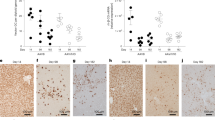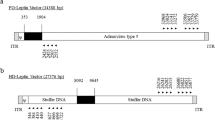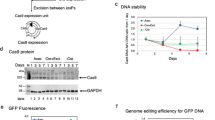Abstract
Extensive in vivo gene transfer studies in animal models and human gene therapy clinical trials with E1-deleted adenovirus vectors have demonstrated transience of transgene expression due to direct cytopathic effects of the vectors and host immune response to virally expressed proteins. In order to overcome these difficulties, we have recently developed packaging cell lines which support the growth of adenovirus vectors containing lethal deletions in both E1 and E4 gene regions. Here we demonstrate that use of E1/E4-deleted adenovirus vectors leads to prolonged in vivo transgene expression due to elimination of cytopathic effects and significant reduction of virus-specific immune response.
This is a preview of subscription content, access via your institution
Access options
Subscribe to this journal
Receive 12 print issues and online access
$259.00 per year
only $21.58 per issue
Buy this article
- Purchase on Springer Link
- Instant access to full article PDF
Prices may be subject to local taxes which are calculated during checkout
Similar content being viewed by others
Author information
Authors and Affiliations
Rights and permissions
About this article
Cite this article
Wang, Q., Greenburg, G., Bunch, D. et al. Persistent transgene expression in mouse liver following in vivo gene transfer with a ΔE1/ΔE4 adenovirus vector. Gene Ther 4, 393–400 (1997). https://doi.org/10.1038/sj.gt.3300404
Received:
Accepted:
Issue Date:
DOI: https://doi.org/10.1038/sj.gt.3300404
Keywords
This article is cited by
-
Modification of Adenovirus Gene Transfer Vectors With Synthetic Polymers: A Scientific Review and Technical Guide
Molecular Therapy (2008)
-
Increased revascularization efficacy after administration of an adenovirus encoding VEGF121
Gene Therapy (2004)
-
Cotransfection of heme oxygenase-1 prevents the acute inflammation elicited by a second adenovirus
Gene Therapy (2003)
-
Human adenovirus type 35: nucleotide sequence and vector development
Gene Therapy (2003)
-
Persistent hepatic expression of human apo A-I after transfer with a helper-virus independent adenoviral vector
Gene Therapy (2002)



